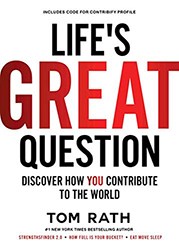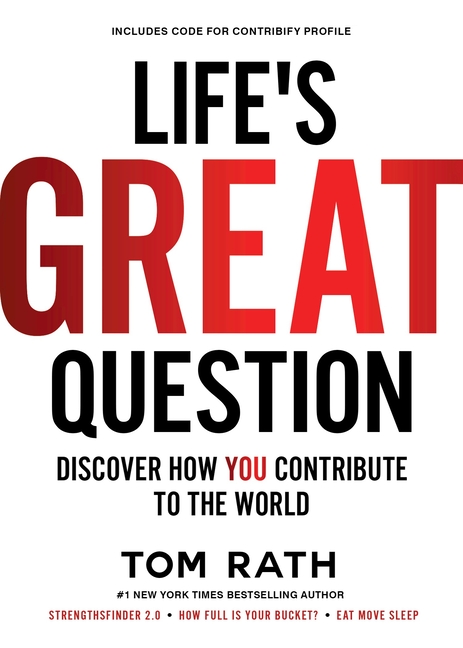Life's Great Question: Discover How You Contribute To The World
February 07, 2020
"Self-awareness is extremely important. But getting to know yourself is important primarily, Tom Rath believes, because it allows you to connect and contribute to the lives of others."
 Life's Great Question: Discover How You Contribute To The World by Tom Rath, Silicon Guild
Life's Great Question: Discover How You Contribute To The World by Tom Rath, Silicon Guild
“You can’t be anything you want to be.” It is, perhaps, not what you’d expect to read from one of the world’s most prolific and influential personal development authors, but it is the beginning of Tom Rath’s most cited passage. Rath lightened that load by adding that “you can be a lot more of who you already are.” The author of StrengthsFinder 2.0 has only become more convinced since he wrote those lines that you can’t be anything you want to be. What concerns him is that his second proclamation, that “you can be a lot more of who you already are,” may inadvertently lead some to take a too self-centered mindset.
The personality assessment found in StrengthsFinder 2.0 helps people identify and invest in their greatest strengths to become “more of who they already are.” The online assessment has been taken by more than 20 million people, and the book itself is Amazon’s top selling non-fiction book of all time—remaining in its top ten for over a decade. Being so successful has also meant that it has come in for its fair share of criticism—he offers a subtle one himself, that “trying to be someone you are not is a big mistake, but so is having a completely fixed mindset about who you are”—but understanding your personality, natural abilities, and strengths is undeniably a great starting point to doing your best and most impactful work. Rath simply adds that, now…
… it’s time to push beyond personality and look outward to purpose. The ultimate goal of development should be more about service and less about self.
Self-awareness is extremely important. But getting to know yourself is important primarily, he believes, because it allows you to connect and contribute to the lives of others. With that understanding, his new book, Life's Great Question, asks that you focus on your impact on others, and offers an assessment to identify and invest more in the contribution you are making.
This is what I believe we should all aim for: to make contributions to others’ lives that will grow infinitely in our absence.
While we should all strive to do that in our private lives, we should also be able to find that purpose in the work we do. A lot of advice about finding professional purpose focuses on finding your passion and following it, which is misguided advice at best (as Cal Newport made clear in his book So Good They Can’t Ignore You) and dangerous at worst (as Ellen Ruppel Shell made clear with her description of a passionate firefighter turned arsonist in one of my favorite books, The Job). The critique Rath raises is that it focuses on pursuing your own happiness, which is usually fleeting, rather than making a contribution to others and the world that is lasting. “Instead of following your passion,” he suggests, “find your greatest contribution.”
You can start doing that in the work you do right now, by asking what you can give to others more intentionally and frequently. It is unfortunate that, as Rath puts it, “most discussion about purpose tends to downplay the actual value of the work people are currently doing.” It is true that the vast majority of us really need the job we have, and also true that most have one that undermines our health and wellbeing—a fact that Jeffrey Pfeffer documents well in Dying for a Paycheck, a book Rath directly references in Life's Great Question. “On average,” Rath writes, “work is killing people when it should be making them healthier.” There is something unquestionably broken in our relationship to work, and it is up to all of us to fix it.
Rath makes an analogy to designing a home, and how “it is unlikely that your frustration with a color of paint in one room would ever send you running out to buy a new home right away.” Yet we often make that jump when considering what is imperfect in our work lives, thinking the only way out of the rut is to get out of the job we currently have and into another. Focusing on the contribution you make in people’s lives gives you the agency and ownership over your work that you need to start improving it today. Focus on the contribution you make to specific people, whether it be a customer, a coworker, or someone you lead. Progress may be slow, nonlinear, and not always align with the title or salary you desire, but “it is possible to turn the job you have into the job you want.”
The 12 Contributions Rath identifies in Part II of the book, devoting a chapter each to the larger topics of Create, Relate, and Operate, are:
CREATE
Initiating: How do we get started?
Challenging: Are we doing the right things?
Teaching: What do people need to know?
Visioning: What should we do next?RELATE
Connecting: How do we connect people to our mission?
Energizing: How do we get and stay charged?
Perceiving: What does each person need?
Influencing: How can we grow our client base?OPERATE
Organizing: How do we make things run smoothly
Achieving: How can we get more done?
Adapting: How can we adapt quickly to changes?
Scaling: How can we reach more people?
Focusing on your strengths is key to understanding who you are and doing your best work, but asking what you can give helps align “who you are with what the world needs.” That kind of language about what the world needs suggests the political to me—not in a partisan sense, but in the sense of Otto Von Bismarck’s proclamation that “politics is the art of the possible.” I have always read that quote in a positive light. These divisive times remind me that what is possible is not always positive. We must remember that the personal is political, and that our professional lives are personal as well. Nothing in life is “just business.” We must support rather than subordinate those around us, in whatever ways we can—as a spouse and a lover, a parent, guardian, or mentor, a teacher or a coach, an employee or a manager. Because as Rath reminds us:
In the end, few will care if you were a senior vice-president, had 10,000 social media followers, or had a million dollars. What will matter is that you were a loving friend, great developer of people, or someone who strengthened your community.
Rath learned when he was 16 years old that he has a rare genetic mutation that would lead to cancer—in multiple organs, and that would likely spread to other areas. He has spent the last 25 years battling those cancers and tumors. This has given him and his work a sense of urgency and perspective:
I know from my deeply personal experience that you don’t have tomorrow to do what matters most. Tomorrow turns into the next day, but you always have today.
Let’s use it to make what is possible positive and prosperous for those around us rather than painful and perilous to our health.



